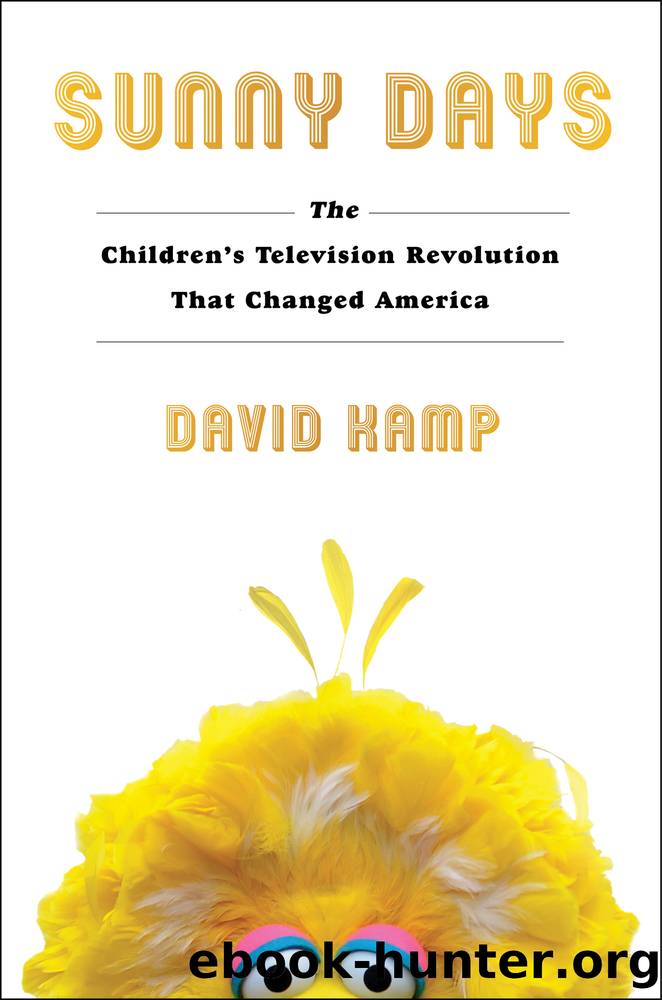Sunny Days by David Kamp

Author:David Kamp
Language: eng
Format: epub
Publisher: Simon & Schuster
Published: 2020-05-12T00:00:00+00:00
* * *
Few of these public declarations of good intent yielded quality TV, though—and the networks knew it. In 1972, Broadcasting magazine derisively referred to an epidemic of “brownie-points shows,” and an anonymous network executive more or less owned up to this assessment, describing his and his competitors’ new programs as “appeasement gestures, and expensive ones at that, to placate those who don’t think we’re living up to our responsibilities in the area of children’s programming.”
Still, the brownie-points era produced some decent results. In 1972, ABC launched ABC Afterschool Specials, an anthology series of short films irregularly broadcast on weekday afternoons. Most of them, though not all, traded in themes similar to those covered by Judy Blume in her contemporaneous young-adult novels: feelings of not fitting in, or of being bullied, or of navigating the divorce of one’s parents.
To more cynical tweens, the Afterschool Specials were maudlin shlock, the stuff of mockery and parody. But the specials played well to the sensitivities of kids going through their own moments of emotional tenderness, and they reached a wide audience—sufficiently enough that the series ran, on and off, for fifteen years. In its launch phase, ABC Afterschool Specials also made stars of the young actors Jodie Foster, whose debut special was the Emmy-winning Rookie of the Year, in which she played an eleven-year-old who integrated her brother’s all-male baseball team, and Kristy McNichol, who sulked through the self-explanatory Me and Dad’s New Wife.
In 1971, CBS kicked into gear an interstitial mini-program, broadcast between cartoon shows on Saturday mornings, called In the News, memorable for its intro and outro bumpers, in which a vector-graphics animation of a spinning globe was accompanied by a blippity-bloop audio loop of what sounded like digital percolation. Narrated in a deadpan baritone by the veteran CBS newsman Christopher Glenn, In the News presented two-minute feature reports for viewers of elementary-school age, on subjects ranging from the Watergate scandal to the origins of ketchup. Like the Afterschool Specials, it proved to have a long shelf life, remaining a part of CBS’s children’s programming through 1986.
The most tangibly educational and entertaining of the networks’ full-length children’s series was Fat Albert and the Cosby Kids, which premiered on CBS in 1972. The show owed its placement on the network’s Saturday-morning schedule to the convergence of CBS’s FCC-placating agenda and Bill Cosby’s desire to position himself as an educator and role model. In the early 1970s, Cosby was a prominent face of African American progress: a college-educated stand-up comic who had in the sixties graduated to leading-man TV stardom in the NBC espionage series I Spy, for which he won three Emmy Awards. Cosby was also—publicly, at least—the very picture of a family man. In 1972, the year he turned thirty-five, he and his wife, Camille, were the parents of three children, with two more to come, and he exuded a hipster-dad affability that anticipated his 1980s national-treasure status as Dr. Cliff Huxtable on The Cosby Show.
In other words, he was a
Download
This site does not store any files on its server. We only index and link to content provided by other sites. Please contact the content providers to delete copyright contents if any and email us, we'll remove relevant links or contents immediately.
Cecilia; Or, Memoirs of an Heiress — Volume 1 by Fanny Burney(31320)
Cecilia; Or, Memoirs of an Heiress — Volume 3 by Fanny Burney(30927)
Cecilia; Or, Memoirs of an Heiress — Volume 2 by Fanny Burney(30884)
The Great Music City by Andrea Baker(21137)
We're Going to Need More Wine by Gabrielle Union(18062)
Bombshells: Glamour Girls of a Lifetime by Sullivan Steve(13098)
Pimp by Iceberg Slim(12920)
All the Missing Girls by Megan Miranda(12737)
Fifty Shades Freed by E L James(12442)
Norse Mythology by Gaiman Neil(11869)
Talking to Strangers by Malcolm Gladwell(11852)
Crazy Rich Asians by Kevin Kwan(8340)
Mindhunter: Inside the FBI's Elite Serial Crime Unit by John E. Douglas & Mark Olshaker(7823)
The Lost Art of Listening by Michael P. Nichols(6457)
Enlightenment Now: The Case for Reason, Science, Humanism, and Progress by Steven Pinker(6400)
Bad Blood by John Carreyrou(5760)
The Four Agreements by Don Miguel Ruiz(5500)
Weapons of Math Destruction by Cathy O'Neil(5027)
We Need to Talk by Celeste Headlee(4857)
